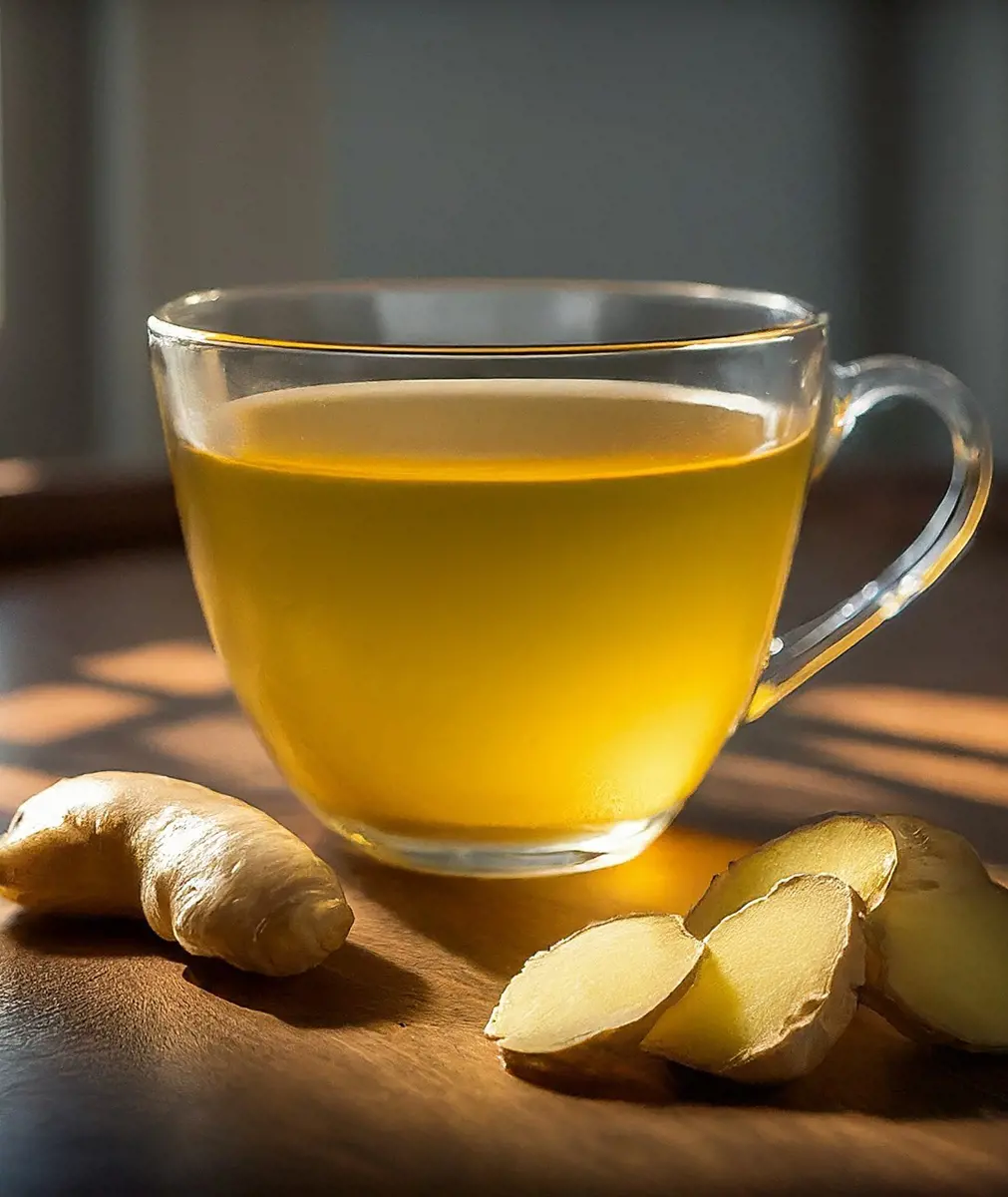15 Ginger Tea Benefits To Revitalize Your Health

This post may contain affiliate links. If you make a purchase through links on our site, we may earn a commission.
Ginger tea has been cherished for centuries across various cultures for its unique flavor and impressive health benefits. This herbal tea infusion boasts a myriad of advantages, making it a popular choice for those seeking a comforting and healthful beverage.
Loaded with antioxidants, ginger tea is an excellent choice for fortifying your immune system. It is a comforting companion during cold and flu seasons, providing relief to a sore throat and congestion. The combination of spicy and slightly sweet notes creates a harmonious symphony in the taste buds. The warmth of ginger adds a comforting element, making it an ideal choice for cozy evenings or chilly mornings.
Let us dive deeper into the myriad benefits of warm ginger tea in this article.
1. Soothing Digestive Aid

Ginger tea has been known for its soothing properties for centuries, especially when it comes to aiding digestion. Drinking tea can help to alleviate a variety of digestive issues, including nausea, bloating, and constipation. Ginger is known to calm the stomach and reduce inflammation, making it an excellent natural remedy for digestive discomfort.
Additionally, it contains compounds called gingerols and shogaols that have been shown to have anti-inflammatory and antioxidant effects which may help to protect against certain chronic diseases.
2. Anti-Inflammatory Powerhouse

Drinking ginger tea can have numerous health benefits, including its anti-inflammatory properties. It is a natural anti-inflammatory powerhouse, and drinking ginger tea can help to reduce inflammation in the body which can be helpful for a variety of conditions.
Inflammation is a natural response to injury or infection but chronic inflammation can lead to a variety of health problems, including arthritis, heart disease, and certain types of cancer. Drinking ginger tea regularly may also help to reduce muscle pain and soreness, improve digestion, boost the immune system, and lower cholesterol levels.
3. Immune System Support

Ginger tea is a popular beverage that has been enjoyed for centuries for both its taste and health benefits. One of the most notable benefits of ginger tea is its ability to support the immune system. It is loaded with antioxidants and anti-inflammatory compounds that help to strengthen the immune system and protect the body from illness and disease.
Drinking ginger tea regularly can help to reduce inflammation, fight off infections, and boost overall immunity. Additionally, ginger tea has been shown to aid in digestion, reduce nausea, and relieve pain and soreness.
4. Nausea Relief

Ginger contains active compounds like gingerol which have been shown to have a calming effect on the digestive system. Drinking ginger tea helps relax the stomach muscles, reducing the sensations of nausea.
After certain medical procedures, individuals may experience postoperative nausea. Ginger tea has been studied for its potential in managing postoperative nausea, offering a natural and accessible solution. Indigestion often manifests with discomfort and nausea. The tea aids in digestion by promoting the production of digestive enzymes, reducing indigestion, and alleviating nausea.
5. Pain Management

Osteoarthritis and rheumatoid arthritis can cause joint pain and stiffness. The anti-inflammatory effects of ginger tea may help alleviate arthritis-related pain by reducing inflammation in the joints.
After an intense workout or physical activity, muscle pain and soreness can occur. Its analgesic properties may assist in relieving muscle pain by reducing inflammation and improving circulation to the affected areas. Fibromyalgia is a condition characterized by widespread musculoskeletal pain. While individual responses vary, some individuals find relief from ginger tea due to its anti-inflammatory and pain-relieving properties.
6. Respiratory Health

Ginger can help reduce inflammation in the respiratory system thanks to its anti-inflammatory properties. This can help ease symptoms of respiratory issues such as cough and asthma. It can help relieve congestion in the chest and sinuses, making it easier to breathe. It can also help clear phlegm from the respiratory system.
Ginger tea can help soothe a sore throat which is a common symptom of respiratory infections. Drinking warm tea can provide warmth to the body, which can be comforting when suffering from respiratory issues.
7. Cardiovascular Health

Ginger tea has been associated with numerous health benefits, including improved cardiovascular health. The antioxidants and anti-inflammatory compounds in ginger can help reduce inflammation and oxidative stress which are major risk factors for heart disease.
Additionally, it has been shown to lower blood pressure, reduce cholesterol levels, and improve circulation, all of which contribute to better heart health. Drinking ginger tea regularly may thus be a simple and effective way to support your cardiovascular system and reduce your risk of heart disease.
8. Stress Reduction

Drinking ginger tea can have several health benefits, including stress reduction. It contains compounds that have anti-inflammatory properties and can help reduce cortisol levels, which is the hormone associated with stress. Drinking regularly can also help improve digestion and reduce nausea which are often associated with stress and anxiety.
Ginger tea can also help boost the immune system and provide relief from sore throat and respiratory infections, which can be beneficial during times of stress. Overall, incorporating tea into your daily routine can be a great way to support your overall health and wellbeing.
9. Weight Management Support

Drinking ginger tea can be beneficial for weight management support as it helps to suppress appetite and increase metabolism. It contains compounds that can help to increase feelings of fullness which can reduce the amount of food and calories that one consumes throughout the day.
Additionally, ginger has been shown to increase metabolism and promote fat burning which can aid in weight loss efforts. Drinking regularly can also help to reduce inflammation in the body which has been linked to obesity and weight gain. Overall, incorporating ginger tea into your diet can be a natural and effective way to support your weight management goals.
10. Menstrual Pain Relief

Ginger contains compounds that have anti-inflammatory and analgesic properties, which can help alleviate menstrual cramps. According to a study published in Verywell Health, ginger has warming and pain-relieving properties that can help relieve menstrual cramps and period pain.
In addition, drinking ginger tea can also help reduce nausea and vomiting which are common symptoms of menstruation. Moreover, ginger tea has antioxidant properties that can help boost the immune system and protect the body from free radical damage.
11. Diabetes Management

In recent years, studies have also found that ginger tea can be beneficial for managing diabetes. It can help reduce blood sugar levels in people with diabetes. It contains compounds that increase insulin sensitivity and improve glucose uptake in cells which helps lower blood sugar levels.
Diabetes can lead to various complications such as neuropathy, kidney damage, and vision loss. Its anti-inflammatory and antioxidant properties can help reduce inflammation and oxidative stress which are major contributors to these complications.
12. Antimicrobial Properties

The tea has demonstrated antibacterial effects against different strains of bacteria. Regular consumption may help in preventing and managing bacterial infections, particularly those affecting the digestive system.
Studies suggest that ginger exhibits antiviral activity which can be beneficial in inhibiting the replication of certain viruses. This makes ginger tea a potential ally in supporting the immune system during viral infections, such as the common cold or flu. The antifungal properties of ginger make it effective against certain fungal strains. Including ginger tea in your routine may assist in preventing or managing fungal infections, such as those affecting the skin or nails.
13. Anti-Cancer Potential

Ginger tea is rich in antioxidants that protect cells from free radical damage. Free radicals are unstable molecules that can damage DNA and cause cancer. Its antioxidant effects can help prevent cancer. Apoptosis is a process by which damaged cells are programmed to die. Its active compounds can induce apoptosis in cancer cells, preventing their growth and spread.
Angiogenesis is the process by which new blood vessels are formed. Cancer cells need new blood vessels to grow and spread. The tea has chemopreventive effects, meaning it can prevent the development of cancer. Studies have shown that its active compounds can inhibit the growth of cancer cells and reduce the risk of cancer.
14. Glowing Skin

Ginger possesses antibacterial and antifungal properties that may help prevent acne breakouts. Regular consumption of ginger tea can contribute to a balanced internal environment, reducing the likelihood of bacterial or fungal overgrowth that can lead to acne.
The warming properties of ginger promote improved blood circulation. Enhanced blood flow ensures that skin cells receive an adequate supply of nutrients and oxygen, promoting a healthy and rosy complexion. Its ability to reduce inflammation and stimulate cell regeneration may contribute to the fading of scars and hyperpigmentation. Over time, consistent consumption of ginger tea can assist in achieving a more even skin tone.
15. Improved Cognitive Function

Ginger contains more than 100 compounds, most of which are antioxidants that are particularly important for brain health. Since it uses a lot of oxygen, the brain is more susceptible to free radical attack than any other body part.
Antioxidants act as free radical scavengers and help prevent or slow cell damage. Chronic inflammation of the brain may lead to brain disorders including depression, anxiety, ADHD, and brain fog. Its anti-inflammatory properties may be beneficial for brain health.
Recent posts
Nutrition
Nutrition
Liquorice Root: Benefits And Uses
You can spell it liquorice or licorice; this herb or root has been in use for centuries in most medicinal applications, as a natural sweetener and to enhance flavors. Regarding its origins, it comes from the root of the "Glycyrrhiza galbre" plant and...
Nutrition
Is Ramen Healthy? Here's What Dietician Says
Ramen is a traditional dish from Japan that in the recent era has become a global phenomenon. This beloved and comforting soupy dish however has been questioned, when it comes to its nutrition. Best for those looking for a quick (instant), affo...
Nutrition
Is Wheat Bread Healthy? An Expert Picks
Wheat bread has been proudly celebrated as a dietary staple in countless homes for as long as people can remember. It has earned a reputation as a healthier alternative to white or any other processed bread, that no one can deny. Because of its evide...
Nutrition
Is Sausages Healthy? Nutrition And Health Benefits
Sausages are tasty in an addictive way, making them one of the most popular foods worldwide. You may have enjoyed this convenient food often, whether on a bun with mustard or grilled on a barbecue, the simple preparation methods are what makes its co...
Nutrition
Ice Cream Benefits: Nutrition, Potential Risks And Best Choices
Not gonna lie, ice cream is often taken as a guilty pleasure treat, a delightful treat that takes you to cloud nine but is frequently associated with negative health implications. Nonetheless, the happy news is when devoured mindfully, ice cream can ...
Nutrition
Is Sushi Healthy? Some Good and Bad Choices
Sushi is a wholesome meal and a beloved Japanese dish. The traditional sushi recipe is a simple combination of fresh fish, vegetables, and vinegared rice which is popular for its minimalistic preparation. As with any food, there are factors that dete...







